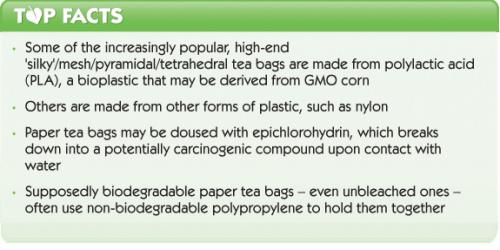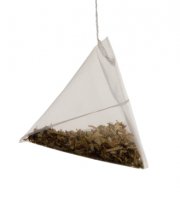At last, a spare moment. As you cradle the comforting warmth of a steaming mug of delicious tea, you mentally tick off its benefits: loaded with antioxidants and other health-giving properties, check; organic, check; fairly traded, check. But even this checklist may not be enough if your teabag is made from genetically modified (GM) ingredients or plastic.

The big business of ethical tea
Feeding the habits of tea lovers is bigger business than ever. In particular, an increasing number of tea brands specialise in products aimed at the more ‘conscious’ consumer – people who weigh up factors such as how and where their teas are grown, bought and sold alongside more traditional attributes such as taste, smell and appearance.
Undoubtedly, the vast majority of this new breed of consumers believes that genetically modified organisms (GMOs) have as much place in their teacups as pesticides and heavy metals. Unfortunately, amid all the justifiable attention lavished on Fairtrade ingredients and organic certification of teas, one crucial factor is being almost entirely overlooked: the teabag itself.
Welcome to the tea temple
A current trend among specialist tea manufacturers is to enclose their wares in a pyramid-shaped or tetrahedral bag, rather than the square or round bags that are still largely the norm. Because there is more space in the pyramidal bags, the theory goes, higher quality, whole-leaf teas can be used and water can more easily circulate around the tea, thus reducing brewing time. Upmarket brands like Teapigs in the UK have enthusiastically promoted the pyramidal tea bag – sorry, ‘tea temple’ – as indispensable to producing the perfect cuppa from luxury ingredients.
GMOs, GMOs everywhere
However, just as Teapigs isn’t the plucky little independent company that it makes itself out to be, there’s more to pyramidal tea bags than meets the eye. Terms like ‘silky’, ‘mesh’ and, yes, ‘temple’ are deployed by manufacturers to describe tea bags made from polylactic acid (PLA) – a type of plastic. PLA is generally made from corn starch, 85% of which is GM in the USA. Although no GM DNA remains in the tea bag material and therefore cannot end up in the tea itself, many tea drinkers will be disturbed to learn that their tea bags are derived from GMOs.
Even ‘biodegradable’ tea bags are made from potentially GMO PLA, a fact made abundantly clear on the website of Fuso/Nasa, one of the pioneers in the field. And because PLA is a bioplastic, there are some real question marks over just how rapidly biodegradable they might be.
More plastic, vicar?
It’s important to differentiate bioplastic, PLA, pyramidal tea bags from their nylon-based cousins. Others are made from polyethylene terephthalate (PET), and while these aren’t GMO sources, they are still both plastics – something the aforementioned conscious consumers may well want to avoid putting into their teacups, their bodies or landfill.
Even more insidious, however, is the practise by certain tea companies of saturating bleached paper tea bags with epichlorohydrin to prevent tears. Epichlorohydrin hydrolyses to a potentially carcinogenic compound, 3-MCPD, upon contact with water. Even epichlorohydrin-free, unbleached tea bags may have significant plastic content thanks to the – non-biodegradable – polypropylene used to hold the bags together.
Solutions: take the (GMO) plastic out of your tea!
- Ditch the tea bags and use organic, fairly traded loose-leaf tea and an infuser instead
- Check the website of your favourite tea manufacturer for information on the substances named in this article, and write to them and ask for details if necessary
- An incomplete list of companies that don’t use epichlorohydrin can be found here, and Food Babe has researched other health-related aspects of teas. Non-US readers should note that both articles are US-centric
- Gardeners should tear open tea bags before composting
- The existence of potentially GMO PLA tea bags means that organic certifiers, including the UK’s Soil Association, may have given the green light to products with GMOs in the supply chain. The Non-GMO Disclosure Project in the US gives consumers confidence that certified products adhere to the current best practise for GMO avoidance, and some tea manufacturers have several products approved under the scheme. However, even the Non-GMO Disclosure Project applies a 0.9% threshold level for GMO contamination, in line with European Union standards.








Comments
your voice counts
16 October 2013 at 8:44 pm
The solution to avoiding all of the pitfalls contained in this splendid article about tea bags is simple in the extreme. Do what I and my family have done for years. Buy organic loose tea, an old fashioned 'crock' or stainless steel tea pot and make your tea with near boiling water from a non-fluoridated source. This can be water from a reverse osmosis unit or a laboratory grade water distillation unit, which is our choice. The human race is essentially an inventive one. Solutions to problems presented by industry, commerce and government interests can always be overcome.
16 October 2013 at 10:47 pm
Can you check Equal Exchange for the epichlorohydrin?
17 October 2013 at 5:16 pm
Useful post. I assume the same thing applies to camomile and other herbal teas. This is quite an annoying situation, as you would frankly expect organic producers not to do this sort of thing.
On loose organic tea, I have been looking for it for some time, as I saw substantially the same article elsewhere a few weeks ago. Most shops don't have any that I can see, and I have never seen it loose in jars or canisters or in paper packets. I have only seen it in aluminium tins, which do not seem good from the point of view of trying to minimise aluminium ingestion and help avoid Alzheimer's. But maybe the best option is buy that and immediately take it out of the aluminium tin and put it in another container.
20 October 2013 at 12:11 am
...very informative..thank you!
18 March 2014 at 7:00 am
I am so glad that I switched to loose tea a couple of years ago and at the time we did not even know about the toxic Junk that the tea bags them selves where made from. Thanks for a very informative article on the gmo's and chem's the tea bags have nowadays.
09 October 2014 at 9:54 am
Nice article about Organic tea.. Thanks
14 April 2015 at 10:04 pm
Is it safe to take the tea leaves out of the paper bag and seep it separately?
16 April 2015 at 2:40 pm
Yes, but we'd suggest that if you're going to all that trouble you perhaps try drinking fresh leaf tea instead
25 July 2016 at 5:00 am
Hi! I own a little Tea Company..blending my tea/herbals with pesticide free ingredients. I use local herbs, knowing the soil and and knowing they are not sprayed. I always recommend a stainless steel infuser. Customers are asking about the cute infusers made of rubber..I am assuming that when boiling water hits it..gmos are released in the tea...do you know?
03 November 2023 at 7:50 am
I didn't know anything about this. I'll have to be more careful drinking tea.
18 November 2023 at 7:07 am
This is really some impressive information I didn't know about GMO's in tea. I saw an article on another website that was similar about glue that's cancer causing that they can put in tea bags it's scary to think that the tea itself isn't always safe because of GMO's
Your voice counts
We welcome your comments and are very interested in your point of view, but we ask that you keep them relevant to the article, that they be civil and without commercial links. All comments are moderated prior to being published. We reserve the right to edit or not publish comments that we consider abusive or offensive.
There is extra content here from a third party provider. You will be unable to see this content unless you agree to allow Content Cookies. Cookie Preferences